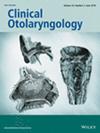Beyond the CBC: Can Novel Markers Predict Recurrence in Chronic Rhinosinusitis With Nasal Polyposis?
Abstract
Introduction
This study aimed to investigate the potential prognostic value of eosinophil count, eosinophil-monocyte ratio (EMR), total IgE, systemic immune-inflammatory index (SII), systemic inflammation response index (SIRI), neutrophil-lymphocyte ratio (NLR), platelet-lymphocyte ratio (PLR), and the presence of asthma and acetylsalicylic acid (ASA) sensitivity in predicting postoperative recurrence in patients with chronic rhinosinusitis with nasal polyposis (CRSwNP).
Methods
Patients with CRSwNP were divided into two groups based on recurrence within 3 years postoperatively: Group 1 (non-recurrent) included patients with no signs of recurrence, and Group 2 (recurrent) included those with endoscopic evidence of recurrence. A control group of age- and gender-matched healthy individuals without any history of inflammation and with normal nasal endoscopy findings was also included. Eosinophil, EMR, total IgE, NLR, PLR, SII, SIRI, and the presence of asthma and ASA sensitivity were compared among the groups.
Results
The recurrent NP group had significantly higher median total IgE and PLR compared to the non-recurrent group (p = 0.036). Compared to controls, the recurrent NP group had significantly elevated eosinophil, EMR, SII, and SIRI levels (p < 0.001, p = 0.022, and p = 0.038, respectively). No significant differences in PLR, SII, or SIRI were found between the non-recurrent and control groups (p = 1). Multivariate logistic regression identified asthma as an independent predictor of recurrence.
Conclusion
EMR, SII, and SIRI may serve as valuable biomarkers in CRSwNP. Their elevated levels in recurrent cases support their potential role in predicting postoperative recurrence.


 求助内容:
求助内容: 应助结果提醒方式:
应助结果提醒方式:


